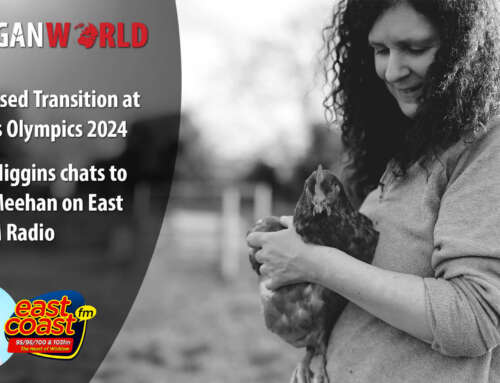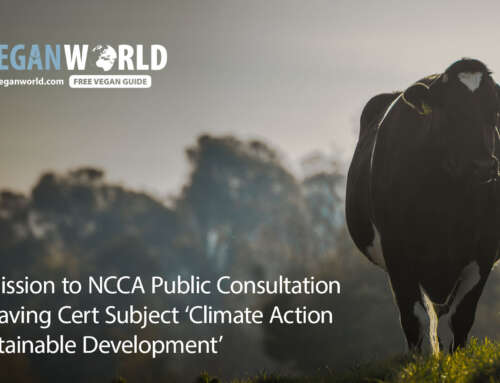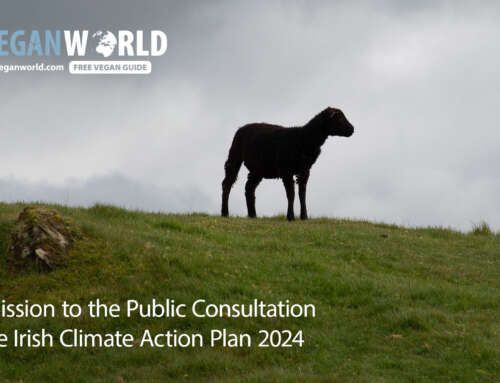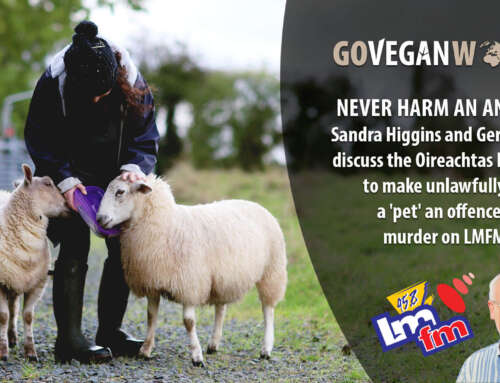31st December 2021
Go Vegan World challenges Lord Deben’s accusation that vegans are ‘opponents of climate change’ with Trisha Goodard on talkRADIO
Lord Deben (John Gummer), chairman of the UK Climate Change Committee and previously Minister for Agriculture, Fisheries & Food and Secretary of State for the Environment of the UK, accused veganism of being an ‘opponent of climate change mitigation’ at the East of England Farming Conference last November. His comments have appeared in several newspaper articles in the last few days, in the run up to the New Year, notably the Telegraph and the Express both of which carry headlines suggesting that vegans use ‘bogus’ arguments about climate change and muddy the climate change debate with our animal rights agenda. Sandra Higgins, founder and director of Go Vegan World, challenged Mr Gummer’s claims in conversation with Trisha Goodard on talkRADIO, 31st December 2021.
Far from being ‘bogus’, vegans claims with respect to diet and climate change are evidence based. A plethora of scientific reports in the last decade or so, all concur that animal agriculture causes ecological destruction, loss of biodiversity and is one of the most significant causes of GHG emissions. (Many of the reports are referenced in this website so readers and listeners are not being asked to accept what vegans say as fact. They are provided with accurate resources to research the issue for themselves).
The UK claims to have a relatively low rate of GHG emimssions from animal agriculture but it is important not to forget that the UK is part of a global problem and climate catastrophe is facing all of us. Because non-vegan UK consumers demand animal products, the deficit that is not produced in the UK is imported from countries with extremely high emissions. For example, a recent report found that agriculture (mostly animal agriculture) emits 37.1% of Irish Greenhouse Gas Emissions (EPA, 2021). The grain grown to feed to animals in the UK is imported from areas where land has been deforested to grow animal foodstuffs. Advocating that British people consume animal products, as Mr Gummer suggests, while the rest of the world reduces or omits them, is anathema to fairness and equality.
Virtually every sound scientific report on the climate catastrophe in the last few years has advocated a plant based diet as an essential way of tackling climate change. Moreover, consuming a plant diet is something that almost every individual can do right now, fairly easily. It is a lot easier and less expensive to change how we eat than it is to put a new central heating system into our homes, or change how we travel to work. A plant diet meets all our nutritional needs and can be significantly cheaper than a diet that includes animal products.
Although veganism is not a diet, a 100% plant diet is an important aspect of veganism because the greatest exploitation of other animals takes place in their use as food. A plant diet is also an important method of tackling inequalities in food justice and human health, and in supporting sustainability. Animal rights violations in general, but particularly in their use as our food, is the point at which there is so much intersectional oppression and violation of both human and animal rights (Nibert, D 2013,Animal Oppression and Human Violence: Domesecration, Capitalism and Global Conflict; Food Empowerment Programme; Kassam, Amir and Laila, 2020, Rethinking Food and Agriculture: New Ways Forward).
At the micro-level, the impacts of the lowest-impact animal products usually exceed those of vegetable substitutes (Poore, Joseph, Reducing food’s environmental impacts through producers and consumers, Science, 2018). Arguments put forward during the show such as the contribution to climate change by vegans consuming fruit out of season, are irrelevant when one considers the considerably greater impact of animal foods than plant foods on the environment and on climate change. At the macro-level, veganism and animal rights are part of a larger social justice movement that is based on the idea that every life matters equally regardless of gender, class, race, religion, or species. Being vegan follows from the challenge to ourspeciesist, human supremacist belief that we matter more than other life forms and confronting the myth that this earth, and the resources it provides, are ours alone. Therefore, it behoves each one of us to be aware of how our lifestyles impact the earth and others, and to reject consumerism. It is only when we realise our place as as one of many other animals on this earth, each of whom have a right to live free of oppression, harm and exploitation; each of whom is entitled to a home or habitat that sustains them, that we understand the true meaning of veganism and why there is a connection between animal rights, human rights and the right of everyone to a healthy environment.
If the statements attributed to Lord Deben in the press are correct, he shows scant understanding of veganism. For instance, he refers to the vegan ‘love of animals’, their ‘concern for animal welfare’ as opposed to animal rights, and he confuses the moral conviction that it is wrong to use and kill other animals, a conviction that has legal protection because it is deemed to be serious, cogent, important and worthy of respect, with religion. He also shows scant understanding of the scientific studies linking animal agriculture to climate change and environmental harm. If Lord Deben was truly interested in the farmers he was pandering to with his anti-vegan sentiment, he would help them transition to a sustainable, plant based system of agriculture based on veganic methods, providing both the financial and practical supports necessary. His statement that ‘British beef’ or any method of animal agriculture is environmentally friendly is entirely without foundation. His claim that “Veganism is not the answer to climate change. Indeed, it is an opponent of solving climate change, because unless we have animals, we cannot have the kind of mixed farming which ought to be a very significant part of the farming community. …We will not get the kind of landscape or healthy soil we need unless we have animals.” is circular and illogical. The grass based system of using other animals for their flesh that he promotes is a net contributor to climate catastrophe, as is all animal agriculture and consumption, regardless of the farming system used or the species of animal exploited (Garnett, Tara, 2017, Grazed and Confused, Food Climate Research Network, University of Oxford). Non-vegan regenerative agriculture is part of the climate change problem. Plant based agriculture is part of the solution. Isn’t it time we all worked together to reach it before it is too late?





